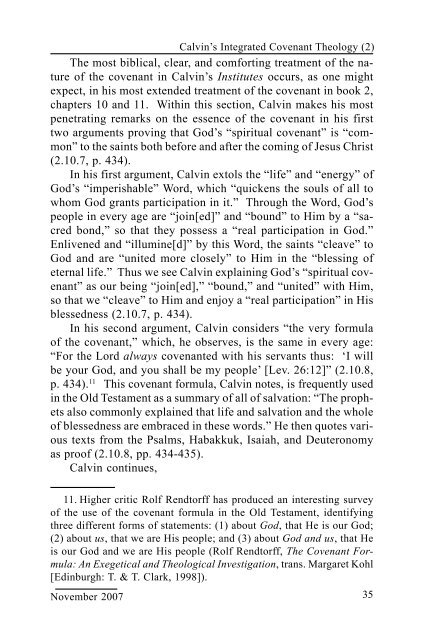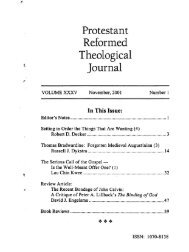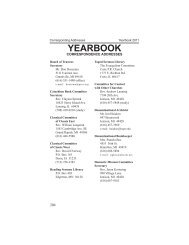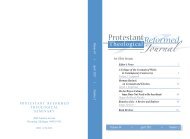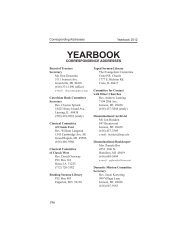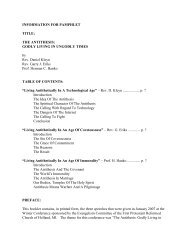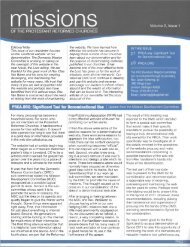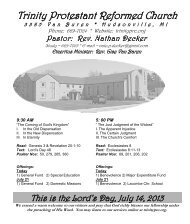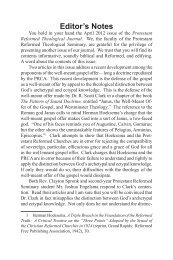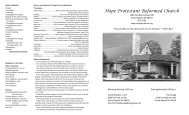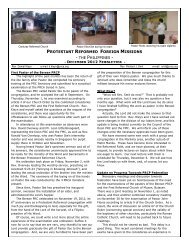November 2007 - Protestant Reformed Churches in America
November 2007 - Protestant Reformed Churches in America
November 2007 - Protestant Reformed Churches in America
You also want an ePaper? Increase the reach of your titles
YUMPU automatically turns print PDFs into web optimized ePapers that Google loves.
Calv<strong>in</strong>’s Integrated Covenant Theology (2)<br />
The most biblical, clear, and comfort<strong>in</strong>g treatment of the nature<br />
of the covenant <strong>in</strong> Calv<strong>in</strong>’s Institutes occurs, as one might<br />
expect, <strong>in</strong> his most extended treatment of the covenant <strong>in</strong> book 2,<br />
chapters 10 and 11. With<strong>in</strong> this section, Calv<strong>in</strong> makes his most<br />
penetrat<strong>in</strong>g remarks on the essence of the covenant <strong>in</strong> his first<br />
two arguments prov<strong>in</strong>g that God’s “spiritual covenant” is “common”<br />
to the sa<strong>in</strong>ts both before and after the com<strong>in</strong>g of Jesus Christ<br />
(2.10.7, p. 434).<br />
In his first argument, Calv<strong>in</strong> extols the “life” and “energy” of<br />
God’s “imperishable” Word, which “quickens the souls of all to<br />
whom God grants participation <strong>in</strong> it.” Through the Word, God’s<br />
people <strong>in</strong> every age are “jo<strong>in</strong>[ed]” and “bound” to Him by a “sacred<br />
bond,” so that they possess a “real participation <strong>in</strong> God.”<br />
Enlivened and “illum<strong>in</strong>e[d]” by this Word, the sa<strong>in</strong>ts “cleave” to<br />
God and are “united more closely” to Him <strong>in</strong> the “bless<strong>in</strong>g of<br />
eternal life.” Thus we see Calv<strong>in</strong> expla<strong>in</strong><strong>in</strong>g God’s “spiritual covenant”<br />
as our be<strong>in</strong>g “jo<strong>in</strong>[ed],” “bound,” and “united” with Him,<br />
so that we “cleave” to Him and enjoy a “real participation” <strong>in</strong> His<br />
blessedness (2.10.7, p. 434).<br />
In his second argument, Calv<strong>in</strong> considers “the very formula<br />
of the covenant,” which, he observes, is the same <strong>in</strong> every age:<br />
“For the Lord always covenanted with his servants thus: ‘I will<br />
be your God, and you shall be my people’ [Lev. 26:12]” (2.10.8,<br />
p. 434). 11 This covenant formula, Calv<strong>in</strong> notes, is frequently used<br />
<strong>in</strong> the Old Testament as a summary of all of salvation: “The prophets<br />
also commonly expla<strong>in</strong>ed that life and salvation and the whole<br />
of blessedness are embraced <strong>in</strong> these words.” He then quotes various<br />
texts from the Psalms, Habakkuk, Isaiah, and Deuteronomy<br />
as proof (2.10.8, pp. 434-435).<br />
Calv<strong>in</strong> cont<strong>in</strong>ues,<br />
11. Higher critic Rolf Rendtorff has produced an <strong>in</strong>terest<strong>in</strong>g survey<br />
of the use of the covenant formula <strong>in</strong> the Old Testament, identify<strong>in</strong>g<br />
three different forms of statements: (1) about God, that He is our God;<br />
(2) about us, that we are His people; and (3) about God and us, that He<br />
is our God and we are His people (Rolf Rendtorff, The Covenant Formula:<br />
An Exegetical and Theological Investigation, trans. Margaret Kohl<br />
[Ed<strong>in</strong>burgh: T. & T. Clark, 1998]).<br />
<strong>November</strong> <strong>2007</strong> 35


